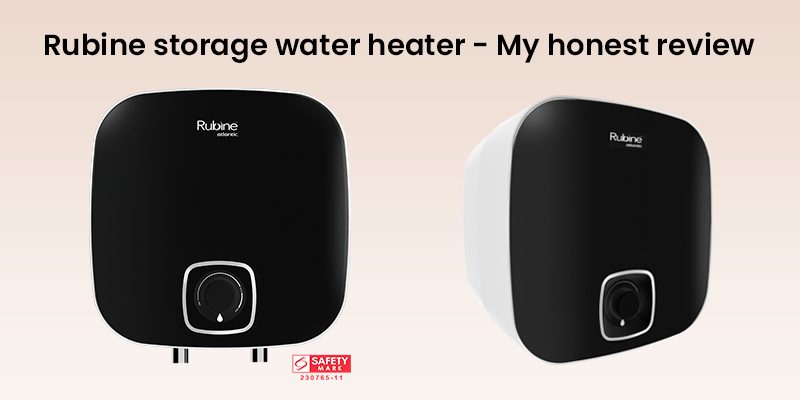Rubine Water Heater Review: Is the Paris Series Worth It?
Choosing the right water heater can make a big difference in your daily comfort, energy costs, and long-term satisfaction. In this Rubine Water Heater Review, we dive deeply into the Paris Series storage water heater to find out what makes it stand out or fall short in real-world use. From build quality and heating performance to durability, safety, and user experience, here’s a detailed look at whether the Paris Series is the right choice for your home.
Overview: What Is the Paris Series?
The Paris Series is Rubine’s storage (tank) type water heater line, typically offered in 15- to 30-litre capacities. It is part of Rubine’s electric heating solution portfolio, blending a French/European design influence with Singaporean engineering and manufacturing standards. The heater boasts an Italian / French aesthetic, and claims features such as energy-saving tanks, anti-leak designs, and modern finish options (black, white).
The model names often include “RA 15” or “RA 30” (for 15 L and 30 L variants), under the “Paris” branding.
In short: the Rubine Paris Series positions itself as a mid- to upper-tier storage heater offering a balance of aesthetics, safety, and performance.
Design, Build & Aesthetics
One of the first things users notice is its styling. The Paris Series attempts to combine elegance with practicality:
-
Sleek finishes — available in black or white (Paris Black, Paris White) to match modern bathroom décor.
-
Compact form factor — though it is a storage heater, the dimensions are kept reasonable so it can fit in many bathrooms without being overly dominant.
-
Tank design & materials — the internal tanks are advertised to use an anti-leak / corrosion resistant design, with enamel coatings or protective linings meant to reduce rusting.
The use of premium appearance elements and a focus on finishing helps the Paris Series compete not just on utility but on visual appeal.
Heating Performance & Efficiency
Performance is a key consideration, and this series delivers in a few areas:
Heating Speed & Temperature Stability
Because this is a storage water heater, the heating time depends on the initial water temperature, the power rating of the heating element, and insulation quality. The Paris models generally provide reasonable performance for 15 L or 30 L usage for showers, hand basins, etc. The heater is expected to maintain stable hot water flow for typical domestic needs.
Insulation & Heat Retention
Good insulation helps minimize heat loss while water is stored. The Paris Series is marketed with energy-saving tanks and claims that the water is kept hot with minimal energy leakage over standby periods.
Efficiency in Daily Use
In practice, because storage heaters heat a whole batch and keep it hot, some energy is wasted maintaining temperature. How much depends on insulation and usage patterns. For frequent on/off usage, instant/point-of-use heaters may be more efficient, but for households where the stored hot water is used regularly, a storage heater like Paris can be effective.
Overall, users report that the Paris Series heater performs adequately for small to medium usage needs though as with many storage heaters, its efficiency depends heavily on usage habits.
Durability, Reliability & Maintenance
Durability is where a water heater proves its true worth. On this front, the Rubine Paris Series fares reasonably well, with some caveats.
Materials & Corrosion Protection
One strong point is the use of quality components and protective measures:
-
Some Rubine storage heaters use SS 316 (stainless steel) heating elements, known for better resistance to corrosion.
-
The internal tank often has enamel coating or anti-rust layers to reduce scaling, rust, and wear over time.
-
Magnesium anode rods or sacrificial anodes are often included to counteract mineral corrosion.
These features suggest a design geared toward longevity, provided water conditions are not extremely aggressive (very hard water or high mineral content).
Warranty & Service
Rubine generally offers warranties on heating elements and inner tanks across their heater lines. Though specifics vary by region and model, typical warranties are several years on the tank and element, plus limited warranty on other parts.
The availability of spare parts and service becomes crucial users in Singapore, for example, have access to service and maintenance networks for Rubine.
Real-World Reliability
According to reviews and industry commentary:
-
Some users express skepticism about claimed energy savings or performance improvements, noting the gains are modest.
-
Community forums comparing Rubine to competing brands often mention concerns about internal rust or leakage over time, a common risk with storage heaters.
-
However, many homeowners find the Paris Series reliable when used with correct installation, periodic maintenance, and in suitable water conditions.
Thus, while not without risks, the Paris Series is fairly competitive if installed and maintained properly.
Safety & Features
Safety is non-negotiable for devices involving electricity and hot water. The Paris Series offers several protective measures:
-
Pressure relief valve — to release excess pressure and avoid tank rupture.
-
Overheat / thermal cut-off protection — to cut heating if water exceeds safe temperatures.
-
Leak / anti-leak design — internal design choices try to minimize corrosion and leakage risks.
-
Dielectric connector / insulating connectors — to prevent galvanic corrosion and ensure safer connections.
-
IP or splash resistance — though details vary, many models meet standard bathroom-safe protection ratings.
These protect against many common failure modes. However, performance depends heavily on correct installation, compliance with electrical codes, and routine servicing.
Pros & Cons
Strengths of Rubine Paris Series
-
Stylish design & finishes — aesthetic appeal above average for storage brands.
-
Balanced capacity options — 15 L and 30 L models suit many households.
-
Good build quality — with protective coatings, corrosion resistance, and safer connectors.
-
Reliable heating performance — adequate for regular household usage.
-
Service network & warranty support — particularly in markets where Rubine is established.
Weaknesses / Caveats
-
Standby heat loss — inherent in storage designs, unless insulation is excellent.
-
Energy efficiency loss in sporadic use — if usage is low, energy may be wasted.
-
Dependence on water quality — high mineral or hard water can shorten life.
-
Higher initial cost — compared to basic storage heaters or instant heaters.
-
Regular maintenance required — to flush sediment, check anodes, and test safety components.
Best Use Cases & Buyer Recommendations
Who should consider buying Paris Series heaters and who might not?
Ideal Users
-
Small to medium households that use hot water regularly (e.g., daily showers, dishwashing).
-
Homes where aesthetics matter (modern bathrooms, visible units).
-
Regions where temperature swings or input water temperature make storage heaters more practical.
-
Users willing to maintain the heater (flushing, checking anodes, inspections).
-
Those valuing brand assurance, warranty, and service network.
Less Ideal Situations
-
Homes with extremely hard water or heavy mineral content (unless water softeners are used).
-
Households with infrequent hot water usage instant heaters may be more efficient in such cases.
-
Very tight spaces or bathrooms with low headroom (though the Paris design is relatively compact).
Final Verdict
In this Rubine water heater review focusing on the Paris Series, the overall impression is positive, with some important caveats.
The Paris Series offers a compelling combination of style, safety, and performance for a storage water heater. Its protective design elements, corrosion-resistant materials, and warranty support give it a competitive edge in its class. For households with typical hot water needs, the Paris Series can deliver reliable performance over years if properly installed and maintained.
That said, it is not flawless. The usual drawbacks of storage heaters standby losses, maintenance demands, dependency on water quality still apply. Buyers have to balance aesthetics, capacity, and usage patterns with long-term costs and care.
If I had to summarize: the Rubine Paris Series is a solid choice among storage water heaters, particularly for those who value look, safety, and after-sales support, and who are willing to handle routine upkeep. But potential buyers should understand that performance and longevity will depend heavily on installation quality, water quality, and maintenance habits.






